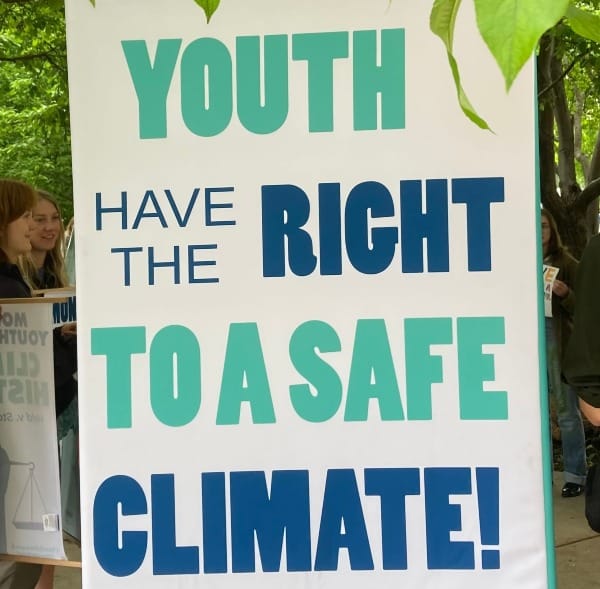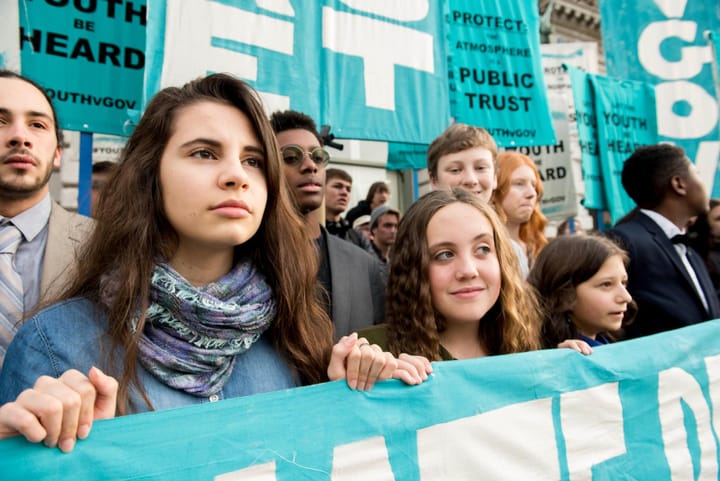Climate Cases Set For Historic Hearings This Week At European Court Of Human Rights

Climate change is on the docket this week at the European Court of Human Rights in Strasbourg, France. The European court will hold its first ever public hearings on climate in two high-profile cases that could have far reaching consequences in terms of clarifying states’ legal obligations on climate action under human rights law.
The court’s Grand Chamber is scheduled to hear two climate cases on Wednesday, March 29. The first case, KlimaSeniorinnen Schweiz and others v. Switzerland, features a group of elderly Swiss women taking on the Swiss government for allegedly failing to take sufficient measures to limit dangerous warming, thereby exposing older women to adverse health impacts from rapidly intensifying extreme heat events. The hearing in this case is slated to start at 9:15am CET, and will be the first climate case ever to come before the Grand Chamber’s panel of 17 judges. The Chamber will hear a second climate case that same day, scheduled for 2:15pm CET. This case, Carême v. France, involves an individual – a former mayor of a coastal French village – suing the French state alleging inadequate climate action and claiming he is personally affected by the government’s response to climate change.
The hearings themselves are historic because it marks the first time the European Court of Human Rights (ECtHR) will be grappling with climate change, which human rights experts have warned threatens human rights on a massive scale.
“This is something new to us,” Natalia Kobylarz, senior lawyer at the Registry of the European Court of Human Rights, said during a recent webinar hosted by the Sabin Center for Climate Change Law at Columbia University. “This is the first time the court is dealing with this particular problem.” She said that the European Convention of Human Rights, the 1950 treaty that the court enforces, was not designed to deal with environmental issues or climate change. The court will be applying the existing legal framework to a novel situation, though one that has clear impacts on a wide range of human rights.
According to a February press release from KlimaSeniorinnen Schweiz and Greenpeace Switzerland, “The final judgement of the ECtHR can have far-reaching consequences, not only in Europe but worldwide, as it can create an important benchmark regarding the human rights obligations of states in connection with climate change.”
The ruling from the court in these two climate cases is expected to come at a later date. The same day the court holds its landmark climate hearings – March 29 – the United Nations General Assembly is scheduled to vote on a resolution led by the Pacific Island state of Vanuatu requesting an advisory opinion from the International Court of Justice clarifying states’ legal obligations to protect the climate system. If the resolution is adopted as expected, the ICJ, which serves as a sort of “world court” under the UN system, will hold hearings and issue its opinion. The advisory opinion “would be a major step forward in understanding how to use the courts to promote climate justice and human rights,” Shaina Sadai, Hitz Fellow for litigation-relevant science at the Union of Concerned Scientists, explained in a recent blog post.
Additional Climate Lawsuits Pending
The climate cases that will come before the ECtHR Grand Chamber this week are just two out of a handful of climate cases that have been filed with the court over the last three years. A groundbreaking lawsuit brought against 33 European states by six Portuguese youth, launched in September 2020, has also been referred to the Grand Chamber and is slated for a hearing later this year. Similar cases from two young adults in Italy targeting 33 European states are on hold until the Grand Chamber rules on the climate cases before it. Additionally, cases brought against Austria, Germany, Norway, and a dozen European states are also “adjourned” or paused pending the Grand Chamber’s resolution of the initial climate cases before it.
What are the Cases the Court Will Hear This Week?
The KlimaSeniorinnen case notably involves not youth plaintiffs but rather senior citizens. A group called Senior Women for Climate Protection Switzerland along with four individual elderly Swiss women initiated legal action against the Swiss government in 2016. They argue that the government's climate targets are insufficient to limit warming to well below 2 degrees Celsius – the objective set forth in the Paris Agreement - and violate their fundamental rights under the Swiss constitution and the European Convention on Human Rights. The Swiss courts rejected the case, and having exhausted domestic remedies, the plaintiffs then applied to the European Court of Human Rights in November 2020. They allege the government’s failure to adequately respond to the climate crisis violates their rights to life and to private and family life under Articles 2 and 8 of the European Convention on Human Rights. The plaintiffs want the court to order Switzerland to adopt more stringent climate policy measures aligned with limiting warming to 1.5°C, including concrete emission reduction targets.
As one of the members of the Senior Women for Climate Protection Switzerland association wrote in a recent blog post, the case is not only about the rights of Swiss elders. The potential impact for younger generations is a big reason driving many of the senior women to take on the climate fight through the courts.
“In the legal process, we are only fighting for our human rights. At the same time, it is important to us that this fight also benefits younger and future generations. The great concern for the future of our children and grandchildren is an important, undeniable motivation for my commitment,” Elisabeth Stern explained.
The Carême case is also not brought by young people, or even by a group. The plaintiff is an individual, Damien Carême, who resides in the northern French coastal community of Grande-Synthe and served as mayor from 2001 to 2019. In 2019 he and his municipality brought legal action against the French State for refusing to take stronger measures to meet its objective of reducing emissions 40 percent by 2030. The Conseil d’État handled the case, finding in favor of the municipality and ordering the national government to take additional actions as necessary by March 31, 2022; the court however dismissed Carême's interest in the case. This dismissal formed the basis for the application to the ECtHR. Carême contends that he does have a stake or interest in whether or not the government takes more stringent climate action, as escalating climate change impacts his capacity to enjoy his property and private life in a place vulnerable to impacts like coastal flooding. He brings his case under Article 2 (right to life) and Article 8 (right to private and family life) of the European Convention on Human Rights.
As a press release from the European Court on Human Rights further explains, Carême “submits that he is directly affected by the Government’s failure to take sufficient steps in the combat against climate change, since this failure increases the risk that his home might be affected in the years to come, and in any event by 2030, and that it is already affecting the conditions in which he occupies his property, in particular by not allowing him to plan his life peacefully there. He adds that the extent of the risks to his home will depend in particular on the results obtained by the French Government in the prevention of climate change.”
Proceedings from the March 29 hearings will be available to watch (as webcasts, not live) on the court’s website.


